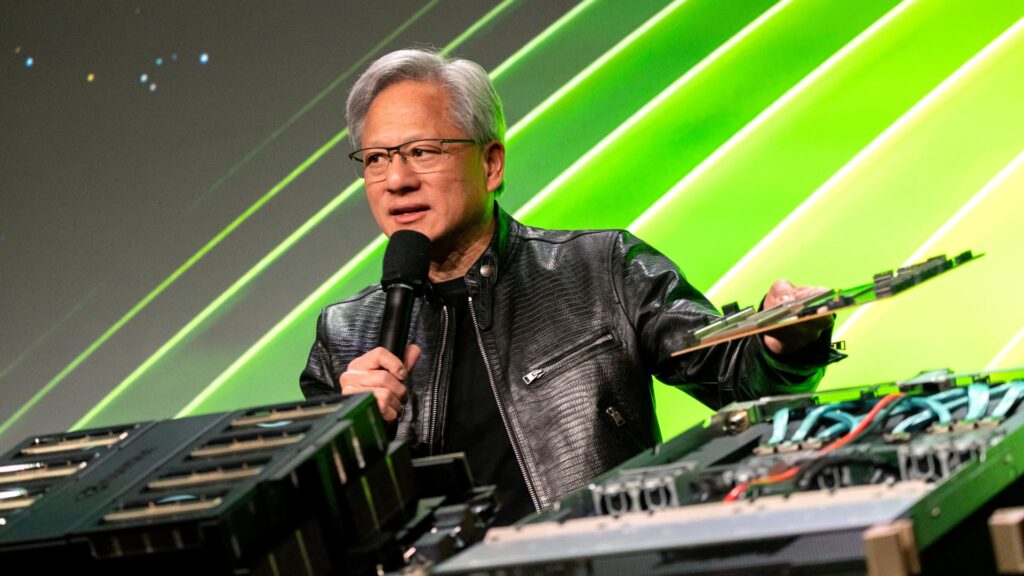Nvidia’s recent 27% surge in May propelled its market capitalization to $2.7 trillion, placing it just below Microsoft and Apple as one of the most valuable public companies globally. The company experienced a threefold increase in sales year-over-year for the third consecutive quarter, driven by the soaring demand for its AI processors.
According to Mizuho Securities, Nvidia dominates between 70% and 95% of the market share for AI chips utilized in training and deploying models like OpenAI’s GPT. This is emphasized by Nvidia’s impressive 78% gross margin, a remarkable figure for a hardware company that must manufacture and distribute physical products.
In contrast, competitors such as Intel and Advanced Micro Devices reported lower gross margins in the latest quarter, at 41% and 47% respectively.
Nvidia’s supremacy in the AI chip market has been compared to a protective barrier by some experts. The company’s leading AI GPUs, such as the H100, combined with its CUDA software, have provided such a significant advantage that transitioning to an alternative appears almost inconceivable.
Nvidia’s CEO, Jensen Huang, whose net worth has surged from $3 billion to approximately $90 billion in the last five years, has expressed apprehension about the company losing its competitive edge. At a conference last year, he acknowledged the emergence of numerous formidable competitors.
Emerging Chipmakers
Startups and established players alike are vying for a share of the lucrative AI chip market, projected to reach $400 billion in annual sales within the next five years. Despite Nvidia’s significant revenues, reaching about $80 billion over the past four quarters, and estimates suggesting $34.5 billion in AI chip sales last year, the competition is intensifying.
Many companies challenging Nvidia are betting that distinct architectures or specific trade-offs could result in superior chips tailored for particular tasks. Device manufacturers are also developing technologies that could potentially handle a substantial portion of AI computations currently executed in large GPU-based clusters in the cloud.
Fernando Vidal, co-founder of 3Fourteen Research, emphasizes the progress in narrowing the divide, stating, “Today, Nvidia is the go-to hardware for training and running AI models, but the playing field is leveling with advancements from hyperscalers and startups in designing their silicon.”
Rising Competition
While Nvidia maintains its position in the market, it faces challenges from some of its significant customers. Tech giants like Google, Microsoft, and Amazon are developing processors internally, potentially posing a threat to Nvidia’s dominance.
Amazon, for example, introduced its AI-focused chips under the Inferentia brand name, designed to offer cost-efficient alternatives to Nvidia’s offerings. Similarly, Google’s Tensor Processing Units (TPUs) have been instrumental in training and deploying AI models since 2015.
Microsoft is progressing with its AI accelerator and processor development, aiming to reduce dependence on external chip suppliers. Meta, not a cloud provider but heavily reliant on computing power for its operations, is also exploring in-house chip solutions for greater efficiency.
The push towards developing custom chips for prominent cloud providers could create a substantial market opportunity worth up to $30 billion, with significant growth prospects.
Innovative Startups
Despite the challenges, venture capitalists are investing in AI semiconductor startups, recognizing the potential for innovation and differentiation in this competitive landscape. Companies like Cerebras Systems are leveraging advanced technology to address fundamental AI operations efficiently.
Cerebras’ approach, with its WSE-2 chip, offers a unique alternative to traditional GPU architectures, potentially catering to distinct AI requirements. Other startups, such as D-Matrix, are exploring novel solutions that could complement existing GPU setups, enhancing computational efficiency and reducing costs.
The emergence of these startups is not only fostering competition but also providing customers with a range of options in the AI chip market.
Tech Giants’ Response
Tech behemoths like Apple and Qualcomm are adapting their chip designs to handle AI tasks more efficiently. By incorporating specialized neural processors into their chips, these companies aim to enhance performance, privacy, and power efficiency in running AI models.
Qualcomm’s recent announcement of a PC chip enabling AI services directly on devices signifies a shift towards on-device processing, reducing reliance on external computing resources. Apple, renowned for its optimized hardware, is integrating AI capabilities into its products, showcasing the potential for AI advancements at the consumer level.











